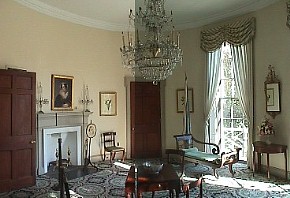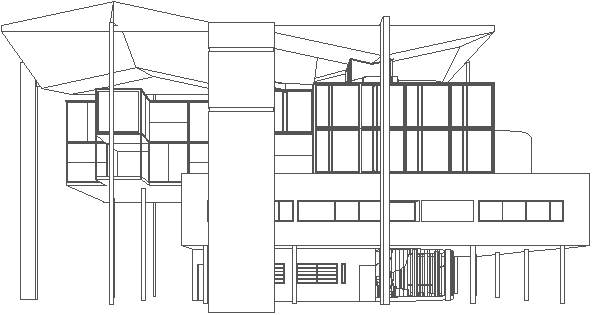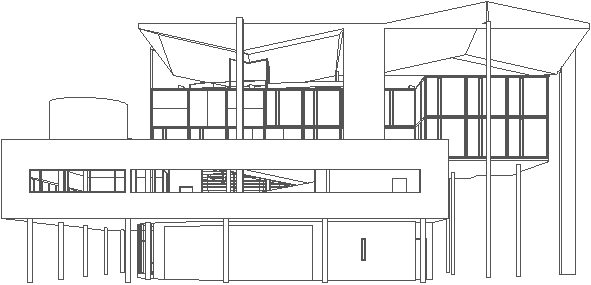92050501 Market St. East Development plans elevations models
2136i01
2005.05.05 19:40
ideal academic project?
Looks like a lot of you like oxymoron architecture. Anyone into onomatopoeia architecture?
2005.05.05 23:19
Koolhaas versus the Actor
I just realized that there are (at least) two English "l'architecture dans le boudoir" texts by Tafuri. The 'first' was published in Oppositions 3 (May 1974), the 'second' is chapter 8 of The Sphere and the Labyrinth (1980). The text I started reading today is the one from Oppositions, and I've now compared the two texts and they are not at all identical. For example, Piranesi is not referenced at all in the first text. Overall, much has been added to the second text to 'fill it out' and update it, but there are also some changes (although some of the changes may be due to different translators).
Yes, the concept of reenactment is there within "l'architecture dans le boudoir," but nowhere does Tafuri explain or even recognize it as such. Tafuri mentions that a "code" has been lost, and thus the language architects use is devoid of meaning, implying that if the code were still known, then the meaning would be known as well. For me, reenactionary architecturism is the code and the provider of meaning.
In English, the first chapter of The Sphere and the Labyrinth is "The Wicked Architect," and this chapter was published earlier and separately as well, (or maybe I'm thinking of the first chapter of Architecture and Utopia as having been published earlier).
Anyway, it looks to me like The Sphere and the Labyrinth is itself a bricolage, composed of disparate pieces that were ultimately brought together, which perhaps explains the very first paragraph (to which I responded with "How Ironic!").
| |
2006.05.05 10:25
Architectural Pedagogy
Since it's one of the things I want to do before I die, I'm developing a course for blind people who want to teach some courses in architecture. It turns out here though that the blind people themselves are already the only people that can effectively teach this course. "It looks like," the blind consultant said, "maybe you should be developing a course for sighted people to learn how to accept blind people as capable of teaching some courses in architecture." "I think you're right, but you still like my idea of buildings (and classrooms) covered in Braille, don't you?" "Oh yeah, especially the one mixed with carved hieroglyphics."
2006.05.05 16:55
Architectural Criticism
Goeff, it's not true when you say, "And no one says a thing." If you would read A Quondam Banquet of Virtual Sachlichkeit: Part I and A Quondam Banquet of Virtual Sachlichkeit: Part II you would see that a whole bunch has already been said/written within the realm of architectural criticism about the built environment that you say is being ignored. I think you ignore a lot about present-day architecture criticism yourself!
And I love my local Home Depot--it's on the site of the world's largest building implosion, right in Philadelphia no less. Certainly not a place I ignore.
| |
2006.05.05 17:25
Architecture Writers in Philadelphia...
...of the last hundred years or so.
.00
Kimball, Fiske (Sidney Fiske Kimball), 1888-1955, American architect and writer, b. Newton, Mass. He was professor of architecture and fine arts at the Univ. of Michigan (1912-19) and of art and architecture at the Univ. of Virginia (1919-23) and was in charge of the fine arts department, New York Univ. (1923-25). From 1925 until his retirement in 1955 he was director of the Philadelphia Museum of Art and was responsible for the acquisition of many important collections. Much of his architectural work consisted of the restoration of old houses, e.g., of Monticello, the Jefferson home, near Charlottesville, and Stratford, the seat of the Lees, both in Virginia. With G. H. Edgell he wrote A History of Architecture (1918). He was also the author of Domestic Architecture of the American Colonies (1922), American Architecture (1928), and The Creation of the Rococo (1943).
--www.infoplease.com
Almost everything I know about Fiske Kimball comes from reading Triumph on Fairmount, the first time in early 1975. While in Philadelphia Kimball and his wife lived at Lemon Hill, which contains one of my favorite rooms in America, the main oval parlor.

I like how an architect and architectural historian can also be a museum director. It's strange to think that it was an architect who was ultimately most instrumental in getting the Duchamp collection in the Philadelphia Museum of Art--Kimball's letters about his last visit in Los Angeles with the Arensbergs are within A Triumph on Fairmount. Although my favorite 'picture' of Fiske Kimball is:
A woman member brought a friend from New York to visit the museum. Fiske met them in the corridor. To the astonishment of the lady from New York, he knelt and kissed the member's hand. "We are not often honored with such charming visitors," he said. "Allow me to conduct two such exquisite creatures to the latest of our period rooms."
"This is our Louis Quatorze gallery. What things these walls have seen! The Grand Monarque was a great king and a great one for the ladies. What beautiful mistrisses he had! Ah, if you ladies had only lived then he would surely have numbered you among them. Wouldn't you have liked that?" and he dropped to his knees again.
Kimball was forced to retire soon after that.
I actually haven't read any of Kimball's books myself, although I do have A History of Architecture and his "discovery" of the origin of the Rococo is definitely on my to-do list. Yet, I have walked within the Louis Quatorze and Duchamp galleries numerous times. Actions speak louder than words?
Fiske Kimball is a dear recurring character in The Odds of Ottopia and Leaving Obscurity Behind.
| |
08050501 HQ of DATA (Department of Architectural Theory Annexation) model 2397i02
08050502 HQ of DATA (Department of Architectural Theory Annexation) perspectives 2397i03
11050501 Danteum perspectives 2165i08
14050501 Working Title Museum 002 plan 22002 in situ 2324i17
14050502 Working Title Museum 003 plan 22002 in situ 2325i07
16050501 Peter Zumthor LACMA Expansion Los Angeles
16050502 AgwA de vylder vinck taillieu Sport and Leisure Centre Waasmunster
18050501 Hubbe House Fallingwater Jacobs House Villa Mairea Houses Under a Common Roof Farnsworth House Baker House Barragan House and Studio 860 Lake Shore Drive Apartments Glass House elevations 2168i02
18050502 Eames House Maison Curutchet Fifty by Fifty House Casa de Vidro Governor's Palace Unité d'Habitation De Vore House Maisons Jaoul William A. M. Burden House Goldenberg House elevations 217mi02
18050503 Vanna Venturi House Fisher House Milam House Maison de l'Homme House 10: Museum Dominican Motherhouse of the Sisters of St. Catherine de Ricci House 15 House in Old Westbury Gallaratese Housing Block Can Lis elevations 2182i06
18050504 Wall House 2 House VI Bianchi House Housing for La Villette Eclectic Houses Gooding House Gehry Residence Retreat House Brant House Addition elevations 2219i15
18050505 Giovannetti House Koshino House House in Laguna 001 Graves Residence Villa dall'Ava Wacko House 001 ICA House Rachofsky House Dutch House Sober House 1 elevations 2241i02
18050506 domestic elevations 2080i54
19050501 Wacko House 002 plan studio model 2285i09
19050502 Wacko House 002 axonometrics 2285i10
|



